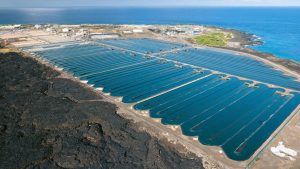
Households could experience a series of three-hour power cuts this winter if Vladimir Putin shuts off gas supplies from Russia and Britain experiences a cold snap, National Grid has warned.
Such an event would mean consumers in different parts of the country being notified a day in advance of three-hour blocks of time during which their power would be cut off, in an effort to reduce total consumption by 5%.
The emergency plan would need to be approved by King Charles on the recommendation of the business secretary.
National Grid said that in the “unlikely event” of a shortage of gas supplies that some consumers would be without power for “pre-defined periods” during a day to “ensure the overall security and integrity of the electricity system across Great Britain”.
It said there would have to be reduced electricity imports from Europe and insufficient gas supply to power stations for the planned power cuts to happen.
National Grid has published a range of scenarios that could occur this winter as it assesses a highly uncertain period for power supplies, amid the fallout from Russia’s invasion of Ukraine.
A senior industry source said: “We’re heading into winter in an unprecedented situation. Even during the cold war, the Soviet Union kept the gas flowing so it’s very unpredictable.”
National Grid has worked on a series of initiatives to attempt to manage supply and demand this winter. It is ready to call into action five coal-fired power plants, which can generate up to 2 gigawatts of power – after signing deals with Drax, EDF and Uniper at a cost of £340m to £395m.
It will also launch a “demand flexibility service” on 1 November that will encourage businesses and consumers to use power outside peak demand periods, including early evenings on weekdays. Consumers with smart meters will be notified the day before and will be paid for using power outside these time periods. The initiative was trialled by Octopus Energy earlier this year.
National Grid hopes this service will free up an extra 2GW, enough to power about 600,000 homes, if enough companies and households participate.
The network operator stressed it was “cautiously confident” that there would be enough electricity to meet the demands of businesses and consumers this winter.
In its “base case” scenario, National Grid’s electricity system operator believes there will be about 3.7GW more of electricity generated than the country needs. It forecast a “sufficient operational surplus throughout winter” although it expects tight margins from early December through to mid-January, excluding Christmas.
However, National Grid mapped out two alternate scenarios in which a shortage of gas in Europe, which could be caused by Russia cutting supplies, or outages in another country’s generation fleet, interrupted energy supplies.
Under the first scenario, electricity imports from France, Belgium and the Netherlands are cut for the whole winter. This would put the coal-fired stations into action and trigger the demand flexibility service.
Under the more drastic vision, a shortage of gas would knock out around 10GW of gas-fired power generation and “temporary rota load shedding”, where consumers are disconnected, would be employed.
A reduction in Russian gas supplied into Europe, including the cut off of the damaged Nord Stream 1 pipeline, has caused a rush for gas supplies in Europe. A European Commission target of filling gas storage facilities by 80% by 1 November looks likely to be hit, however a period of colder weather could push up demand. Although Britain is not reliant on Russian gas, importers are exposed to the knock on effects.
The majority of Great Britain’s gas supplies come from the North Sea and Norway, with the bulk of the remainder from liquified natural gas imports from across the globe. Imports from Europe, notably during winter, typically account for aabout 6% of gas supplies.
However, if a squeeze in Europe puts pressure on these supplies, Britain may be forced to seek gas from different sources, including increased LNG imports where there is competition from countries around the world.
National Grid said it expected gas and electricity prices to remain high through the winter.
Any potential for power cuts will also be highly dependent on the weather. The European Centre for Medium-Range Weather Forecasts this week said Europe could suffer a colder winter with less rain and wind than average. It predicted a period of high pressure over western Europe in November and December that could reduce the amount of renewable power generated.
Fintan Slye, the executive director of National Grid ESO, said: “Under our base case, as set out in the winter outlook, we are cautiously confident that there will be adequate margins through the winter period.
“As an expert and responsible operator of Great Britain’s electricity system it is incumbent on us to also factor in external factors and risks beyond our control like the unprecedented turmoil and volatility in energy markets in Europe and beyond.”

